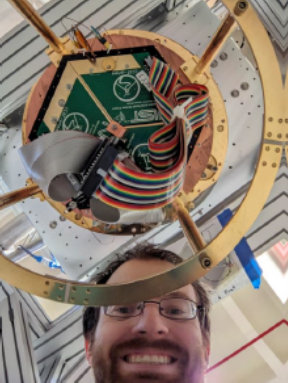
Jordan Wheeler
Physicist
St. Louis, Missouri
Working for my father at an early age in construction taught me how to build. That skill still proves valuable and transferable to my current work. I also have a strong interest in math and science but always wanted to work with my hands. Working with my older brother during my first summer internship at NASA Goddard taught me the basics and fun of astronomical instrumentation. I wouldn’t be here today without their help.
- Ph.D. (2019) • Astrophysical and Planetary Science • University of Colorado of Boulder
- B.Sc. (2012) • Physics and Mathematics • University of Missouri, Columbia
- Physicist at the National Institute of Standards and Technology Boulder, Quantum Sensors Division
- Kinetic inductance detector/superconducting resonator design and testing expert.
![]()
A silicon wafer covered in thousands of far-infrared kinetic inductance detectors.
My research is focused on building detectors for astronomical cameras, much like the sensor in a smartphone. Unlike the sensor in a phone, the detectors I work on are for the type of light that is lower energy than visible/infrared light. These wavelengths of light are known as the far-infrared and sub-millimeter. These detectors are fun to work on because industry hasn’t substantially invested in improving these types of sensors. That means there are still large gains to be made toward improving these detectors and pushing to higher pixel counts.
This fellowship is an opportunity for me to start building a team. I have significantly benefited from many mentors taking the time to train and teach me throughout my career. This opportunity will facilitate my own professional growth and will allow me to become a mentor to others, where I hope to pass on knowledge and skills similar to those that I gleaned from my own mentors in the past.
- Kinetic inductance detectors (KIDs) from mm-wave to the Far-infrared
- Large arrays of kinetic inductance detectors mm and sub-mm telescopes.
- Compact on-chip spectroscopic solutions for mm and sub-mm astronomy.
- Quantum-limited broadband parametric amplifiers using kinetic inductance.
- Developing clever, innovative designs that will make astronomical observations easier, better, and faster.
- Training the next generation of detector experts.
- To teach my children to be thoughtful, creative, and courageous people.
- Having a sense of humor in tough times and remembering to enjoy life.
